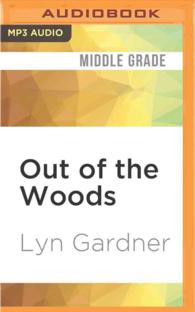- ホーム
- > 洋書
- > 英文書
- > Philosophy
Full Description
Drawing on Merleau-Ponty offers new insights into our understandings of health and illness, ability and disability, and the scientific and cultural practices that both enable and limit our capacity for diverse experiences.
Maurice Merleau-Ponty's work draws our attention to how the body is always our way of having a world and never merely a thing in the world. Our conception of the body must take account of our cultures, our historically located sciences, and our interpersonal relations and cannot reduce the body to a biological given. Normality, Abnormality, and Pathology in Merleau-Ponty takes up Merleau-Ponty's phenomenology of the body to explore the ideas of normality, abnormality, and pathology. Focusing on the lived experiences of various styles of embodiment, the book challenges our usual conceptions of normality and abnormality and shows how seemingly objective scientific research, such as the study of pathological symptoms, is inadequate to the phenomena it purports to comprehend. The book offers new insights into our understandings of health and illness, ability and disability, and the scientific and cultural practices that both enable and limit our capacity for diverse experiences.
Contents
Acknowledgments
Introduction: Normality, Abnormality, and Pathology in Merleau-Ponty's Work
Susan Bredlau and Talia Welsh
Part I: Grounding a Phenomenology of Normality, Abnormality, and Pathology
1. Toward a Phenomenology of Abnormality
Jenny Slatman
2. What Can We Learn about the Normal from the Pathological? Merleau-Ponty, Goldstein, and Neuropsychology
Gabrielle Jackson
3. Merleau-Ponty and Ab/Normal Phenomenology: The Husserlian Roots of Merleau-Ponty's Account of Expression
Neal DeRoo
4. The Abnormalcy of "Normalcy": Merleau-Ponty, Russon, and the Normativity of Experience
Susan Bredlau
5. The Need for Merleau-Ponty in Foucault's Account of the Abnormal
Hannah Lyn Venable
Part II: Practical Phenomenological Applications of Merleau-Ponty's Theories of Normality, Abnormality, and Pathology
6. Meandering Peripheries: A Ground without Figure for Relief
Adam Blair
7. The Insight of Dispossession: Examining the Phenomenological and Political Significance of Merleau-Ponty's Account of the Spatial Level
Whitney Howell
8. Moving without Movement: Merleau-Ponty's "I can" and the Memoirs of Bodily Immobility
James Rakoczi
9. A Whole New World: Reimagining Divergent Sensory and Perceptual Experiences in Autism through Merleau-Ponty's Phenomenology of Perception
Jennifer E. Bradley
10. Health and Other Reveries: Homo Curare, Homo Faber, and the Realization of Care
Joel Michael Reynolds
11. The Desexualization of Disabled People as Existential Harm and the Importance of Ambiguity
Christine Wieseler
Works Cited
Contributors
Index








